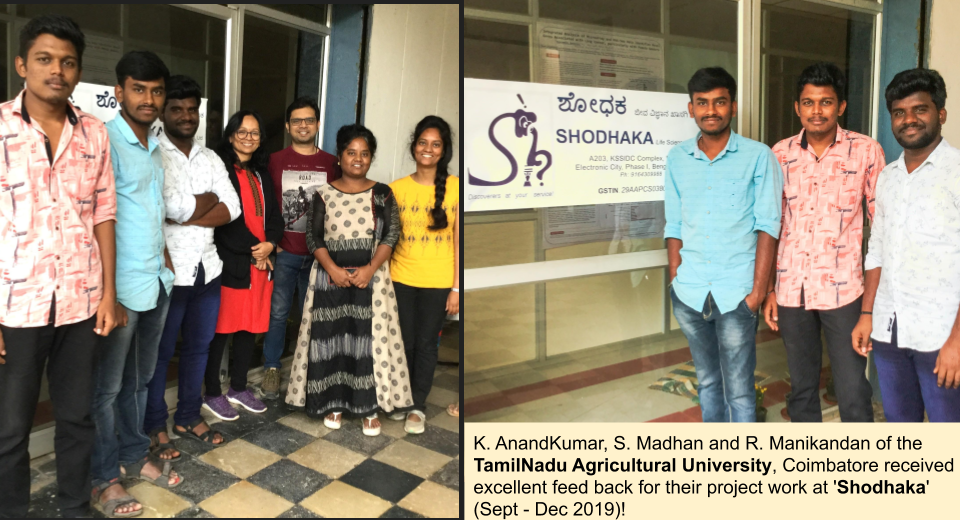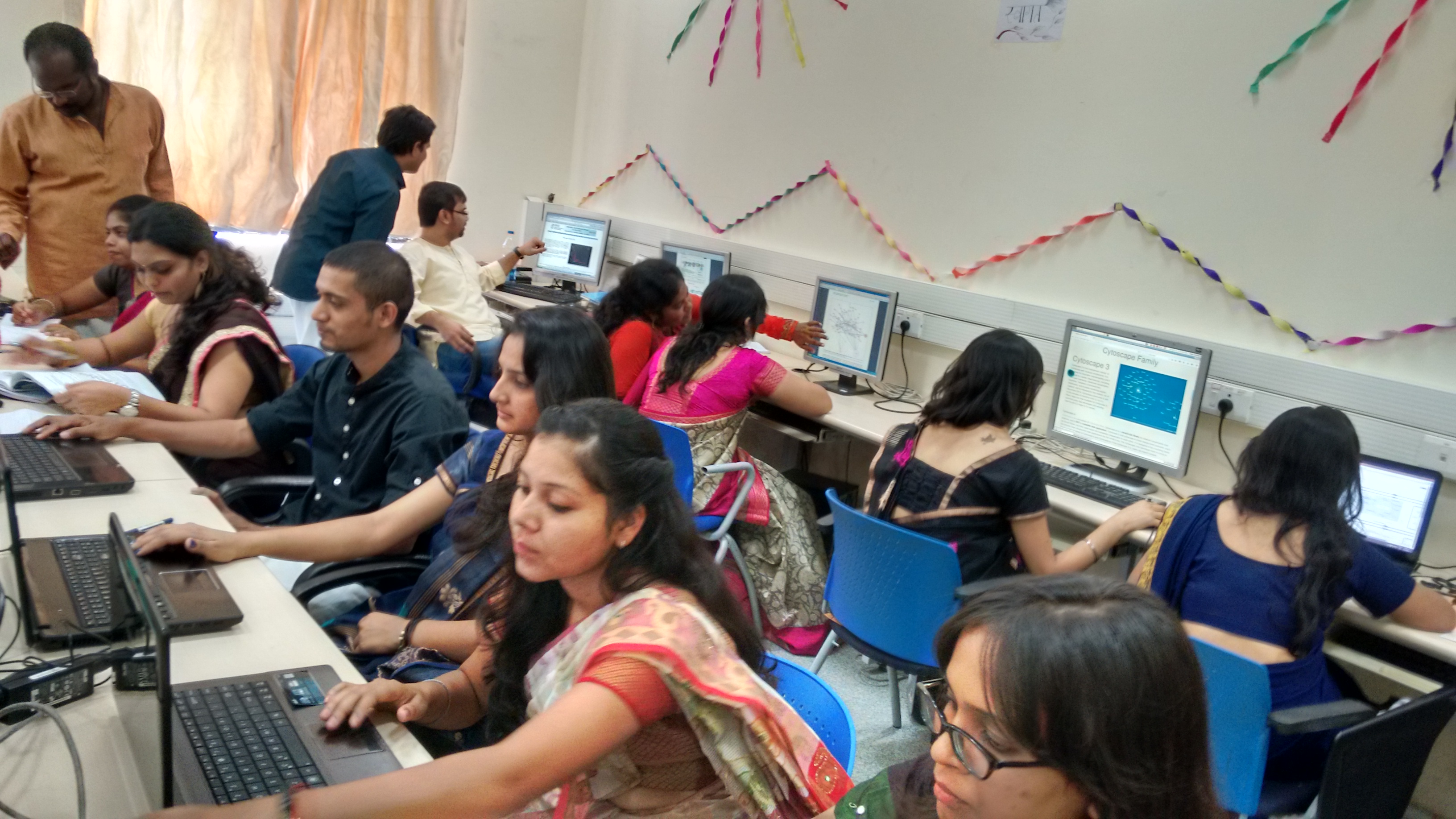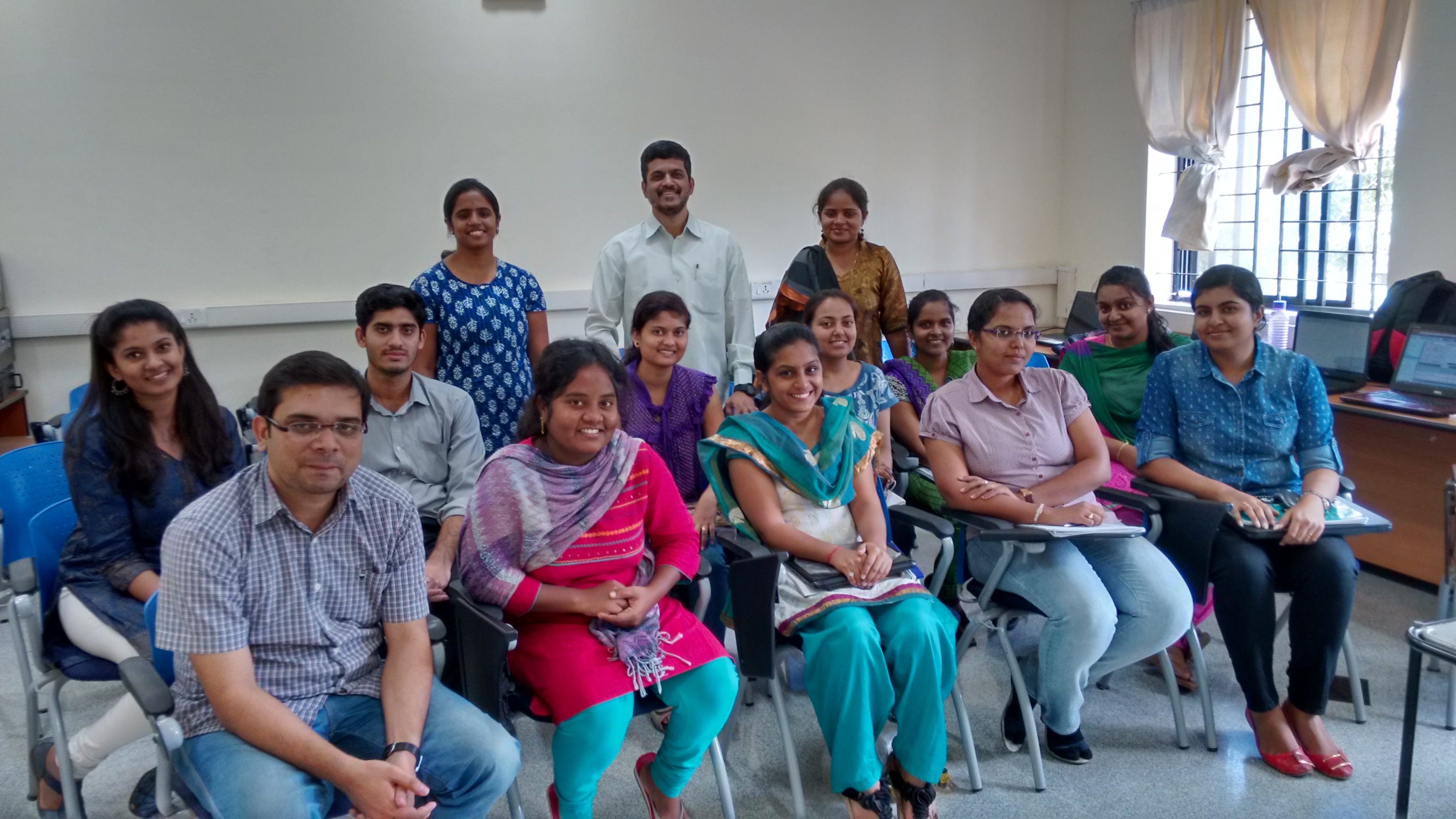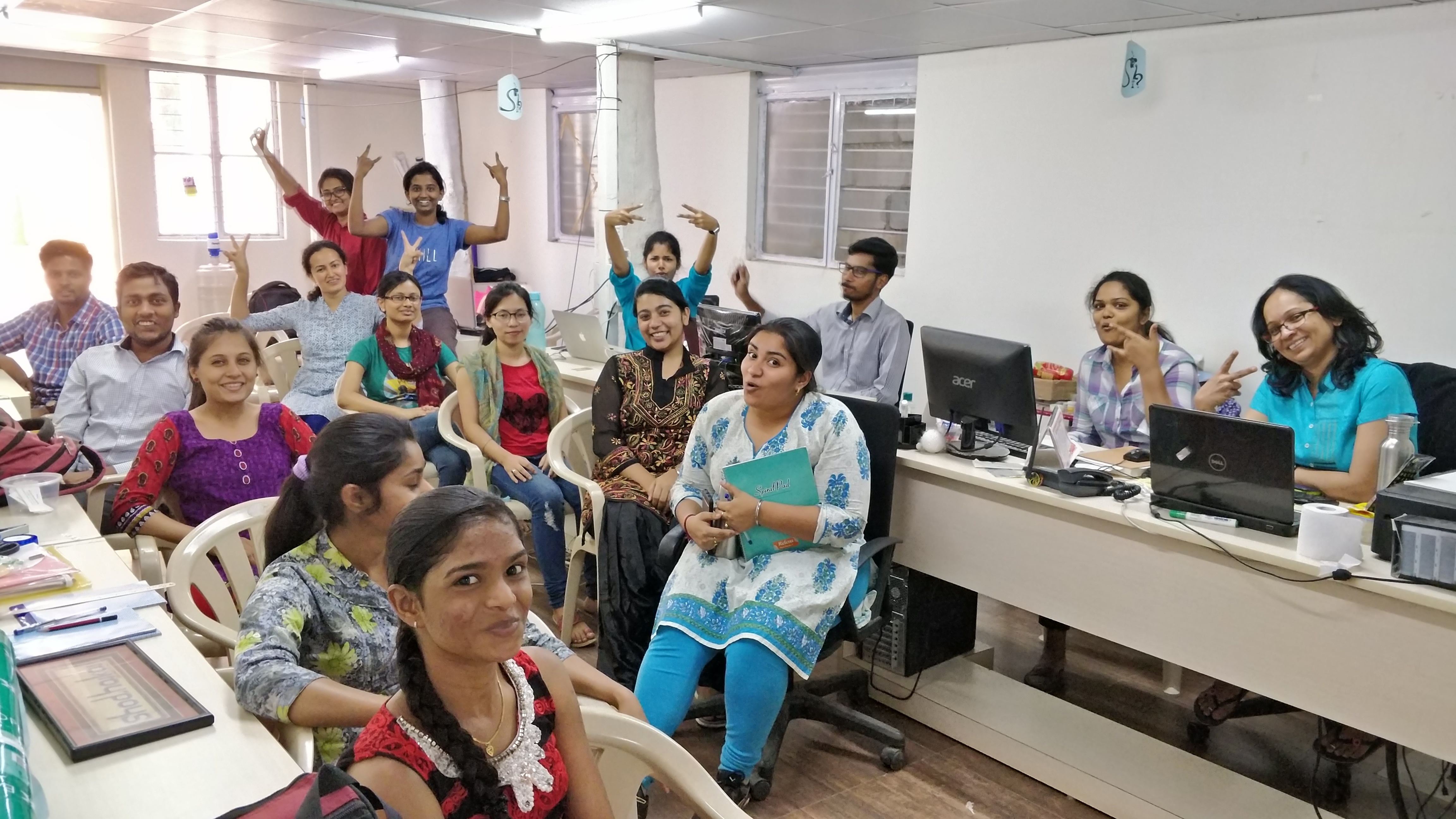We have been particularly leaders in training in NGS data analysis in India, and have conducted more than 15 hands-on training courses/workshops since 2009. Shodhaka has also conducted training for ICMR scientists across India twice. Our course participants have been very happy with the learning experience (see feedback from our participants).
Shodhaka has carefully designed compact training sessions - with or without related background theory sessions. The programs are interactive, and include lectures and discussions. But the demonstrations and meticulously designed practice sessions (with case studies) make bulk of our workshops/courses.
In addition, we are keen to conduct short courses in GMPs, GCPs, IPR, Tech. transfer, Pharmacovigilance & other industrially relevant courses.
A. For BIOTECH and OTHER LIFE SCIENCES students
B. For BIOINFORMATIC students
C. Students interested in MARKETING and OTHER BUSINESS-RELATED experiences can also apply.
We NEVER CHARGE for project work/internship! Minimum charges apply for initial training only, as we find it essential for a meaningful completion of project work for most students, but we also waive training fees for talented ones. Students are encouraged to apply in group and get discount for training fees also (best student in the group may get a fee waiver for training also).
Shodhaka is on constant look out talented students and grow with them, and does not consider training as a means of generating profits. In fact, we have identified best performers in many batches and offered them jobs or helped them to find jobs, and - in some cases promoted their plans for higher studies. Our experts frequently provide counseling for higher studies, CSIR-NET & other competitive exams, finding jobs and planning career. Some of the interns have done a splendid work and are proud co-authors in our research papers published in peer-reviewed high-quality of journals. But only students serious about studies and project work should apply. Hard work and sincerity are a must during the training and project work!
Email the following information:
Current course, semester, college/university, & department
Duration of the project
Expected start date (at least approximate week or month)
and attach your CV.
Email id: shodhaka.ls@gmail.com
Summer training in biotechnology or bioinformatics: duration will be 1 week to 30 days. Part of the training (in the areas listed above) will be for 5 to 15 days followed by assignment or project-based training on a specific aspect.
Summer project work in biotechnology or bioinformatics: duration will be 30 to 90 days. Initial part will consist of training (in the areas listed above) for 5 to 15 days. The candidate has to simultaneously read and begin taking a responsibility for a specific research project
Summer internship in biotechnology or bioinformatics: As above. The project work is same as internship.
Summer training/projects are designed for making a better use of vacation time by students.
Project work in biotechnology or bioinformatics: Expected duration is 4 to 12 months. Initial part will consist of training (in the areas listed above) for about 30 days. The candidate has to simultaneously read and begin taking a responsibility for a specific research project. Biotechnology projects will involve topics such as gene expression regulation mechanism but involve biological analysis of experimental data. This type of work is not bioinformatics. But it does not involve any wet-laboratory experiments also.
Internship in biotechnology or bioinformatics: As above. The project work is same as internship
These long term projects or internships are open to not only students, but also freshers who would like to use their time to learn more and gain experience. After all, not having a job to continue the growth doesn't mean the growth should stop! In fact, we have many such freshers who have grown with us by making a better use of time, and we even publish research papers with them.







Get trained by scientists who are not only routinely involved in omics data analysis, but have also been systematically compiling and comparing bioinformatics databases, software and methods (e.g., J Biomed Inform. Jan 2020, Nature precedings 2011, BMC Genomics 2010, resources related to NGS, genomics, transcriptomics, proteomics and other data analysis: startbioinformatic.com).
AREAS OF TRAINING
(scroll down for contents, fees and duration;
you can also write to: shodhaka.ls@gmail.com)
Note: Our training modules do not involve simple lecture-videos or pre-set tutorials. All topics include carefully planned multiple one-to-one active and live sessions with experienced professionals. The sessions would focus on hands-on practice sessions using specific databases and software that suit each exercise, but would be preceded by theoretical discussions from research and analysis perspectives, and/or detailed demonstrations.
| ☀ | NGS & data analysis |
| ☀ | Functional OMICS data analysis |
| ☀ | Microarray & data analysis, including 'R' |
| ☀ | Biostats and R |
| ☀ | Drug designing |
| ☀ | Bioinformatics for biotechnologists, microbiologists, etc (along with an overview of system biology, big data biology & synthetic biology) |
| ☀ | Career planning |
Details of some of the modules (can be custom-designed further):
ANALYSIS OF NEXT GENERATION SEQUENCING DATA (GENOMICS, METAGENOMICS & RNA-SEQ):
An overview of NGS technology; Concepts, relevance and NGS applications to genomics & transcriptomics, metagenomics and other related omics; quality of sequencing data, depth and coverage of reads; NGS data retrieval using SRA & ENA; Quality analysis and trimming of raw reads; Reference alignment of NGS reads; NGS whole-genome & exome sequencing, and reference assembly; k-mer optimization; SNP analysis concepts & resources; Reference genomes retrieval using UCSC; filtering and annotation de novo assembly concepts and annotation process; de novo assembly of reads to contigs; RNA-sequencing and concepts; Identification of gene & transcript levels, and differential expression; system-level analysis and system biology approaches - concepts; an overview of functional analysis following transcriptomics and proteomics (see the module below for details); Metagenomics, the need & approach, and resources; Metagenomics analysis from NGS reads; OTU identification and analysis; network analysis and functional analysis of microbiomes.
DATA ANALYSIS FOR FUNCTIONAL-OMICS:
Relevance of transcriptomics & proteomics: mass scale gene expression techniques and corresponding data; Protein-interaction retrieval and analysis; Analysis of non-coding RNAs; ontology and pathway analysis; Case studies on molecular interactions, Case studies on pathways; Gene Ontology information retrieval, gene enrichment and functional analysis using different resources such as DAVID; Regulatory network analysis; System biology approaches.
Microarray, ESTs & related Data Analysis:
Gene expression studies, microarray technology: an overview; Data files, and analysis workflow; Applications and resources; Data retrieval using GEO & ArrayExpress; Normalization and clustering principles; Differential expression analysis; Microarray data analysis using R package; Microarray resources, and data retrieval; Network analysis using 'R'; Case studies using microarray resources with BioGPS ; Microarray data analysis using online tools.
BASIC BIOINFORMATICS & BIOLOGICAL DATA MINING & ANALYSIs:
Bioinformatics exercises for molecular cloning: Selecting genes based on disease relevance or expression patterns; gene-, mRNA-, ncRNA- and protein- based data mining; Advanced strategies in literature-based data mining and biocuration; Case studies for selected genes, proteins and diseases; Retrieving and analyzing sequences of RNA or genes; Primer designing & restriction site analysis; Concepts in sequence analysis; Basic sequence analysis exercises; Advanced sequence analysis exercises.
IPR, GMP, GLP, Drug discovery, Clinical trials & GCPs:
Introduction to key concepts in each of these industrially relevant topics; definitions, types and significance of intellectual properties; differences in regulations across countries; prior art searching; claim drafting; stages of patent filing; GMP, GCP and GLP relevance in various sectors; regulatory aspects of GMPs and GCPs, and differences across countries; SOPs; case studies; quality checks - internal and external; regulatory bodies in different countries; Drug discovery, drug designing and pharma industry, and relevance of clinical studies and basic research; Homology modeling; Molecular docking process; Small molecule databases and cheminformatics.
Biostats & 'R':
Basic principles in statistics and relevance to biological research; variable types with examples in life sciences; sampling patterns; study designs; Parametric and non-parametric tests with biological case studies; central tendencies and distribution patterns; case studies in t-test, ANOA, non-parametric equivalents, chi-square test, correlation coefficient, tabulations and graphical representations with illustrations from biological research; case studies with gene expression profiling data and 'R' applications; common tests in omics and case studies in 'R'.
Total duration:
Contact sessions (skype or google hangout can be used for online classes): Multiple short sessions (each may vary between 20 to 60 minutes, depending on what you already know); the duration and number of sessions shall be decided based on a basic simple assessment in the beginning.
Fees:
Amount per contact session will be decided after initial discussions depending on the topic as well as prior knowledge and expertise of the trainee.
| Write to: shodhaka.ls@gmail.com | Phone: +91- 98 440 271 25 |